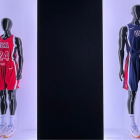Given the money that professional athletes make, you'd think Olympians would be well-compensated. They represent their country in an international event. In the U.S., however, that isn't the case.
The life of a United States Olympian doesn't involve becoming a multi-millionaire or even signing a contract, as athletes do in other sports; in fact, the Winter Olympics may be a testament to national pride, but what they aren't is the best way to get rich.
To get truly wealthy, Olympians need external sources. They need to exceed all expectations and get a combination of both endorsements and prize money.
But that isn't to say that there's no money in the Olympics. Shaun White and Lindsey Vonn have crazy endorsement deals, and after this year's Olympic Games, Chloe Kim will likely find herself in good shape economically. However, Vonn and White didn't just compete in the Olympics. They built a brand. And to build a brand, they were on top of their respective sports for over a decade.
Just competing, however, isn't enough. Take the biathlon team, for example. In an interview with NPR, U.S. athletes talked about how they "get by." Lowell Bailey, a leader on the team, said that the biathlon team doesn't even turn a profit.
"We're still facing budget deficits coming off of our best year ever," he told NPR.
According to the article, biathletes sometimes retire, just because they can't make a living.
"What you see is athletes that stay long enough to make an Olympic team, but then quit because they can't make a living, and they can't ensure their future financially," Bailey said, via NPR. "Imagine if you're a doctor and you go to work and don't know whether or not you're gonna get a paycheck. That's the life of a U.S. biathlete."
Keep in mind the training schedule of an Olympic athlete. They're constantly traveling and going to various events. It's certainly not your traditional workload, which has value, but it is work. And grueling work, at that.
"We travel on Sunday or Monday and we don't slide until Tuesday or Wednesday," luger Tucker West, 22, told USA Today. "So we'll usually have a day or two off where we can go explore or hang out.
"This is life experience," West continued. "We do luge because we love to do luge, but it offers so much more opportunities in life to go explore the world. To go hang out with friends while doing it."
That's fine for a 22-year-old, but the reality is very different for those with families, as Bailey noted above.
The USOC is a non-profit that doesn't receive government funding. The USOC is also the entity that funds Olypmic athletes through their respective federations. However, West's fellow luger Chris Mazdzer is OK with the government not funding its athletes.
"Should the government also kick in? I think there could be a conflict of interest there," he said, per USA Today. "But I think it should be discussed, how they could help out."
The biathlon team isn't the only U.S. federation that needs to be successful to see any green.
"I feel like I will break even every year if we have a successful year," said the skip of the U.S. curling team John Shuster, via USA Today. "If we have not a successful year, it probably ends up costing me a bunch of money."
There is opportunity to make money between the Winter Games, but it's hardly lucrative. Dicks Sporting Goods employs athletes between the Olympics with a program called Contenders, which accommodates their strenuous training schedules while letting them make money during the offseason (offyears).
"I'm an associate in the team sports department," Shuster said. "I give them my schedule of where I'm going to be playing and when I'm going to be training and say, `I can work these particular days.'"
For the athletes, it comes down to the experience, as West noted. Mazdzer agreed with the sentiment. "Even though the sport doesn't pay a whole lot, I have more life experiences than most people I know," he said.
With that in mind, the Olympics aren't about the money. They're about representing your country and getting the opportunity to share in an opportunity that few people get.
"It's all what you value," Will Rhoads, a ski jumper, said to USA Today. "A lot of my friends might be graduating college right now and they're going to go to a great job immediately. And I'm at the Olympics. It just depends what you really want to do, and what you find exciting and worth doing."
Olympic athletes love their sports and they live for the competition. It's cliche, but they're rich. Maybe not in terms of monetary value, but rich in the things that they care about. Even if there's only one Lindsey Vonn and one Shaun White, for all 244 U.S. Olympians, it's a unique experience. And they get to be in the public eye once every four years. They're trying to make that moment count in Pyeongchang.
To keep up with all of the Olympic action, you can follow this link to see the full schedule. For everything else you need to know, from the host country to the starting times of the Games, look here!





















